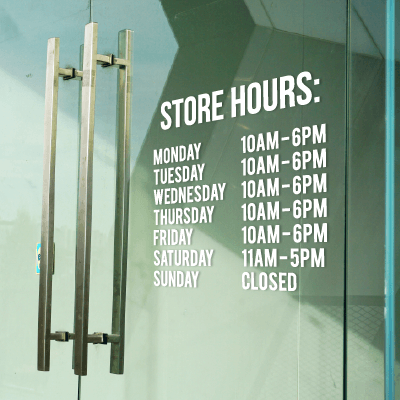Social media has become one of the go-to mediums for growing and marketing a small business. But, is it entirely necessary for a small business to implement a social media marketing strategy? Does every type of small business actually need to use social media? Does social media use actually translate into potential leads and/or sales? We’re going to look at how social media can build your business, while also looking at a few points of caution before taking the social media plunge.
The Facts
The 2016 Small Business Technology Impact Study (conducted by Time Warner Cable) found that 30% of surveyed consumers would not buy from a company without a social media presence. The survey also concluded that 50% of consumers might not buy from a business without a dedicated website. It doesn’t come as a surprise that a solid digital media presence is important for a company, but knowing that not having a presence could deter potential customers is crucial knowledge as to whether every small business needs a social media presence.
So how is it that social media plays a defining role in persuading customers to interact with your business? We’ve seen that credibility, marketing, and customer service are key characteristics of small business social media use. Each play an important role in shaping the buyer’s perception of your business. With consumer buying habits shifting from in-store to online purchases, there is an ever-growing need for a business to build its online presence, including social media even when it may seem like it’s not directly contributing to your bottom line.
Credibility
Establishing your presence on social media can translate into business credibility in the eyes of potential customers. Credibility is how customers view your business based on what other people are saying about your business. Customer reviews are the primary source for this credibility as we know customer buying consideration is usually affected by online reviews. Beyond online reviews, the trick is building this credibility through the services your business offers as well as online content to aid in customer engagement. There’s no perfect plan to build credibility, but we recommend focusing on outstanding customer service (through representatives, social media, and other channels) and reliable, relevant content.
The personality of your business should also be conveyed through a website and social media platforms. Businesses that can connect emotionally with a potential or return customer are more likely to foster greater brand loyalty. Emotional connections can be created in a number of ways, including:
- One-on-one customer service
- Teaming up with a good cause or charity
- Motivating, emotional content
- Content focused on the customer’s needs
- Innovative products that fulfill a desire / need / want
- Visually appealing designs
- Being trendy
Examples of sound customer service, relevant content, and emotional connections can all be easily displayed and promoted through your social media channels. With nearly half of customers saying they may abstain from a business with no social media presence, having a social media presence is the first, but not the only, step. Doing these three things will take it one step further in establishing credibility with potential customers that can ultimately have a direct impact on sales regardless of whether it is properly attributed or not.
Customer service
Incredible customer service can shape the narrative of your business and lead to greater brand loyalty. We’ve seen firsthand how customer service can benefit a growing business, so it goes without saying we’re huge proponents of giving the customer the best experience possible.
Social media has a crucial role in providing high-quality, rapid responses to customer inquiries. This is increasingly important in a world where consumers are always digitally present and have little to no patience for slow responses or phone support only. Whether it’s Facebook, Twitter or otherwise, it’s critical that a business have a social media presence on the platform that makes the most sense for their customer base. Doing so will allow you or an employee to manage these accounts to quickly respond to any complaints, concerns, or feedback of your business.
From both personal and anecdotal evidence, conducting effective customer service on social media is a surefire way to build loyalty with customers (this leads to greater credibility too), that enhance your brand and boost the bottom line.
Marketing
One of the primary functions of small business social media is to directly market to your target audience. Social media sites like Facebook, Twitter, and Instagram, offer marketing tools to aid in advertising on their platform. Snapchat (popular with Gen Z) does not have a proprietary marketing tool built into the platform, but there are ways to implement it into a social media marketing plan.
There are a number of tools out there that can help you manage social and digital marketing. We’ve highlighted a few below that are tailored towards small businesses.
Hootsuite – Allows you to manage all your social media marketing from a simple dashboard. In essence, Hootsuite gives you control in what you post over all your social media profiles, while giving you analytics to track the effectiveness of the post for each platform. Hootsuite offers multiple plans, including a free option, which most services do not offer. The free plan limits you to 3 social media profiles, but if you’re a small business, that shouldn’t be a much of a problem. Also included in the free plan is simple analytics for your social media and a content calendar to schedule posts. The Professional plan (one tier above free) offers 10 social media accounts and real-time analytic tracking.
AgoraPulse – AgoraPulse is another service that allows you to group together your social media accounts into a single platform. AgoraPulse aggregates tools for moderation, content publishing, analytics, and competitions. This gives comprehensive coverage for posting on social media, while offering in-depth analytics for each individual post across all platforms. AgoraPulse allows you to check-off comments or messages that have been responded to, making customer interaction simplified and organized. This service does not offer a free plan at this time.
Sprout Social – Sprout Social, like AgoraPulse and Hootsuite gives you a single platform to manage your social media. The selling point of Sprout Social is the simplified user interface. Sprout also gives users social CRM (Customer Relationship Management) functionality and tools to track social interaction history for each of your followers. Audience discovery is also an added benefit for using Sprout Social.
While some small businesses may assume their customer base isn’t suited for a social media marketing campaign, we’d feel confident in saying that every small business will have at least a portion of their customers on social media. Thus, while the need for and efficacy of social media marketing will vary from company to company, we’d recommend every company should at least be present on social media to keep all marketing options available.
Social Media Mistakes
Even with the advantages of social media, small business owners should be weary of how they implement any social media usage. Yes, there are important precautions that must be taken before jumping headfirst into a social media frenzy. Know what you’re getting into before jumping in; you’ll need to allocate resources to manage multiple accounts, post content at least somewhat regularly, and understand how your audience consumes said content through social media. If you don’t use social media effectively, you may be doing more harm to your business than good.
The Cost of Social Media
Social media is often regarded as ‘free marketing’ and while that is the case to some extent, effective marketing will require paid campaigns and targeted advertising. This will require businesses to allocate funds to enacting a social media campaign. Costs can range anywhere from $1,000 to $7,000 a month depending on if you’re outsourcing your social media marketing, how aggressive your campaigns are, and what social media platforms you use. If you’re keeping social media marketing in-house, then costs could vary depending on how much you want to allocate to paid social campaigns (platforms usually offer costs based on the business’ budget).
Having said that, a small business can always forego paid social campaigns and simply ensure that they are building credibility, providing customer service and marketing as needed if their industry is better suited for this. This represents the bare minimum of social media usage but is required in our opinion given that 50% of customers state they not do business with your company without this basic presence. In this case, your cost will simply be the time spent by yourself or an employee to set up and manage your social platforms.
The cost of using social media can also be numbered in time spent managing the accounts. This is especially prevalent with active customer service and content creation. To put it bluntly, managing a small business social media presence can be a full-time position. That said, if you’re just getting your business up and running and do not have the resources to pay for a dedicated social media marketer, you need to schedule time for managing your social accounts. It’s recommended that you spend anywhere between 4-8 hours a week creating and distributing content, responding to comments and messages, and reviewing analytic reports.
So whether you go all in on social media or simply ensure you’re there when needed, make sure to not forget there is both a monetary and human capital cost involved.
Know Your Platform and Audience
A critical step in your decision process to social media usage is understanding your target audience’s online habits before dumping money into marketing on social media; not every demographic is going to be active on social media, so find out if they are and adjust accordingly (the Pew Research Center has detailed stats on social media demographics). It’s also necessary to know how your business would flourish (or not) on specific platforms. Facebook and Twitter are generally used by most industries. Instagram and Snapchat are more niche platforms, but both can be utilized regardless of industry (as long as you can create compelling, visual content). Each audience consumes content differently; be wary of what appeals to them and how you can utilize their likes and dislikes to your advantage in content creation.
The Bottom Line
When all’s said and done, social media is an extremely versatile and beneficial tool for your small business. While some may say it isn’t necessary for every small business, we recommend setting up your social media presence as soon as you can. Doing so will help your company build credibility, provide channels for effective customer service, keep marketing channels available and at the very least impact your bottom line positively in an indirect fashion. Like we mentioned before, each industry is different, so it’s up to your judgment how and to what extent you should utilize social media platforms. But in the end, the debate over whether it should be used at all or not, is a closed case in our books.




































